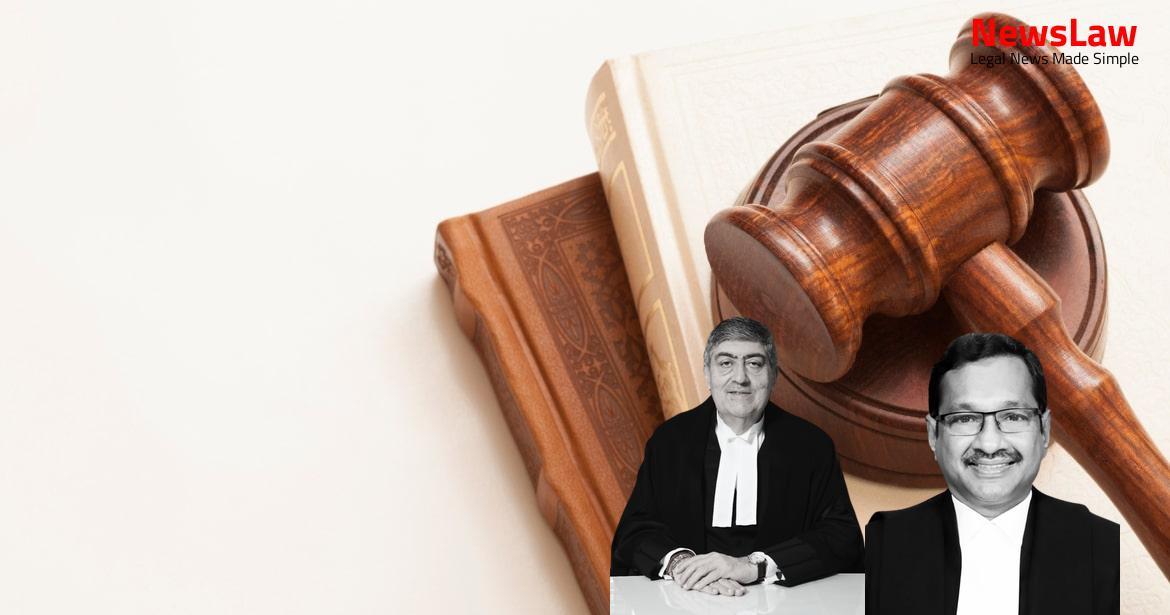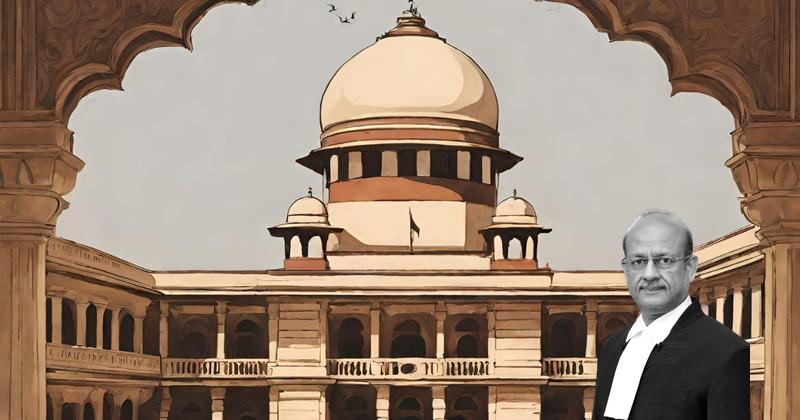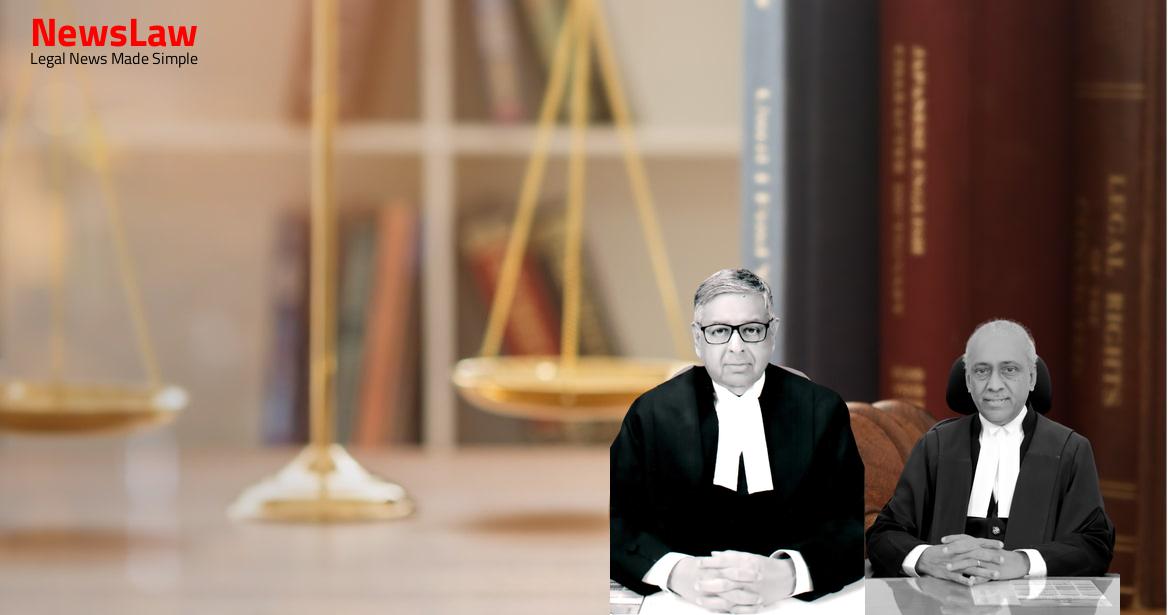Explore the detailed legal examination of affidavit requirements in election petitions, focusing on the court’s analysis. The case delves into whether the absence of a specific affidavit can lead to the dismissal of an election petition, especially when allegations of corrupt practices are involved. The court’s thorough scrutiny of the statutory provisions regarding affidavits and compliance sheds light on the nuanced aspects of election law. Stay tuned to grasp the significance of Form 25 affidavits in maintaining the integrity of election petitions.
Facts
- Respondent Nos. 2 to 6 were sponsored by local/regional parties but were not serious contestants in the elections.
- Respondent no.1 filed an application seeking dismissal of the election petition for non-compliance of certain sections of the RP Act.
- The appellant contested respondent no.1’s application.
- The appellant secured 5,35,282 votes while respondent no.1 secured 6,76,606 votes.
- The Election Commission issued a notification for the elections on 12.01.2019.
- The appellant filed an election petition on 26.06.2019 challenging respondent no.1’s election.
- The appellant sought a declaration that respondent no.1’s election was void due to a false affidavit.
- The appellant contended that filing Form 25 would only be necessary if there were allegations of corrupt practice.
- The appellant asserted substantial compliance with Section 81(3) of the RP Act.
- Respondent No.1 was sponsored by Janatha Dal Secular Party and was also a candidate from the Constituency.
- The High Court, in the case at hand, opined that the absence of an affidavit or a non-compliant affidavit would not cause prejudice to the election petitioner as long as the deficiency was rectified, citing the ruling in Ponnala Lakshmaiah v. Kommuri Pratap Reddy & Ors.
- The learned Single Judge allowed respondent no.1’s application, holding that the phrase ‘any corrupt practice’ in the proviso to Section 83 of the RP Act encompasses all corrupt practices listed under the Act, not just limited to Section 33A.
- The appellant’s argument that the allegations against respondent No.1 were restricted to Section 33A was dismissed by the High Court.
- The High Court found that the appellant had raised issues of undue influence and improper acceptance of respondent No.1’s nomination under Sections 123 and 100 of the RP Act.
- In light of the arguments presented, the High Court concluded that substantial compliance with Section 81(3) of the RP Act is sufficient to prevent the dismissal of an election petition.
Also Read: Supreme Court Judgment on Single Till Mechanism for HRAB Calculation: A Comprehensive Analysis
Issue
- The main issue at hand is whether an election petition can be dismissed immediately if the respondent argues it lacks an affidavit in Form 25, as required by Rule 94A of the Conduct of Election Rules, 1961.
- This question arises especially when the petition is centered around accusations of corrupt practices.
- The critical aspect to be decided is the threshold requirement regarding the format of the affidavit supporting the election petition.
Arguments
- The appellant contended that the election petition grounds were specific to Sections 100(1)(d)(i) and (iv) of the RP Act, related to improper acceptance of nomination and non-compliance with statutory provisions.
- The election petition did not relate to corrupt practice allegations under Section 123 of the RP Act.
- Non-compliance of a mandatory affidavit in Form 25 under Section 83(1) of the RP Act was highlighted, especially in cases involving grave charges of corrupt practices.
- Dismissal of election petitions at the threshold was discussed citing specific circumstances outlined in previous cases.
- The appellant did not allege Section 123 of the RP Act against Respondent No.1, but referenced non-disclosure of assets as a form of corrupt practice.
- Allegations of corrupt practice are mandated to be accompanied by an affidavit in Form 25 as per Section 94A of the Election Rules.
- Non-compliance with signing and verification of pleadings in Section 83(1)(c) of the RP Act was argued not to be fatal, with emphasis on the grounds for dismissal under Section 86(1) of the RP Act.
- The issue of rejection of election petitions on hyper-technical grounds was debated, referencing past judgments like Ponnala Lakshmaiah and G.M. Siddeshwar.
- Learned counsel for respondent No.1 argued that the absence of an affidavit is different from submitting a defective affidavit, as per the G.M. Siddeshwar case.
- Total non-compliance of Section 83 of the RP Act, as per the G.M. Siddeshwar case, cannot be cured.
- Submitting an affidavit at a later stage could lead to embellishment of the case and defeat the statutory requirement.
- The nature of allegations by the appellant against the respondent involved undisclosed profits from commercial operations and receipt of money from a sitting Rajya Sabha member.
- Learned counsel emphasized the distinction between the absence of an affidavit and a defective affidavit, highlighting that the allegations were made without disclosing any sources of information through an affidavit in Form 25.
Also Read: Selection and Appointment of Judicial Officers in Himachal Pradesh
Analysis
- The election petition must comply with the provisions of Section 81, Section 82, or Section 117 as per Section 86(1) of the Representation of the People Act.
- The respondent raised objections regarding the non-compliance of Section 81(3) of the RP Act, stating that the election petition was not attested by the petitioner as a true copy.
- Section 33A of the RP Act mandates candidates to furnish information about any pending criminal cases or past convictions while submitting their nomination papers.
- Section 100(1) of the RP Act outlines grounds for declaring an election void, such as candidate disqualification, corrupt practices, improper nomination rejection, or any non-compliance affecting the election results.
- The allegations of non-disclosure of assets in Form-26 by respondent No.1 are cited as ‘corrupt practice’.
- The necessity of filing an affidavit in Form-25 due to the allegations in the election petition is discussed.
- The High Court’s conclusion that non-submission of Form 25 would lead to dismissal of the election petition is not agreed with.
- The narrow reading of provisions regarding dismissal of an election petition is highlighted.
- The defect in the verification of the affidavit filed in support of the petition is deemed not fatal.
- The issue of index and synopsis not being signed by the appellant is seen as a curable defect.
- The need for filing Form 25 affidavit and the responses to it from both parties are scrutinized.
- The election petition focused on allegations of success obtained by concealment of material pertinent to the electorate’s opinion.
- The requirement of Form 25 submission and its importance are debated.
- The appellant’s failure to file any affidavit in the case is addressed.
- The High Court’s ruling on the necessity of submitting Form 25 is upheld.
- The appellant’s allegations are found to encompass violations beyond Section 33A of the RP Act.
- The scope of arguments before this Court is narrowed down based on the lower court’s findings.
- The appellant’s attestation of the election petition is deemed to have substantially complied with the requirements.
- In G.M. Siddeshwar v. Prasanna Kumar, a Three Judge Bench established three principles regarding compliance with Section 83 of the RP Act.
- Total non-compliance with Section 83 results in the dismissal of the election petition.
- Defects that are curable do not warrant summary dismissal, as per Section 86 of the RP Act.
- The gravity of defects must be assessed on a case-by-case basis to determine non-compliance with an integral part of Section 83.
- Form 25 was deemed an integral part of the election petition, and its complete absence indicated total non-compliance with Section 83 of the RP Act.
- Non-compliance with the proviso to Section 83(1) was ruled not fatal to the maintainability of an election petition and could be remedied.
- Defect in verification of an affidavit is not sufficient ground for dismissal of petitioner’s petition
- Affidavit with defective verification can be filed later
- Ruling based on the case of Murarka Radhey Shyam Ram Kumar v. Roop Singh Rathore
- The violation alleged by respondent no.1 is a matter to be determined in trial and not to be dismissed at the outset.
- The appellant has addressed and corrected the defect pointed out.
- Filing an affidavit in Form 25 now would not allow for embellishment by respondent No.1.
- The appellant has clearly presented the case with supporting material in the election petition.
Decision
- The impugned order of the learned single Judge dated 17.1.2020 is set aside.
- The application filed by respondent no.1 under Order 7 Rule 11, S. 151 of the said Code and S. 86(1) of the RP Act is dismissed.
- The appellant is given liberty to file an appropriate affidavit in Form 25 within fifteen (15) days from today.
- Further proceedings in the election petition need to be taken up urgently as almost two and a half years have been spent on preliminary skirmishes.
- The appeal is allowed and the parties are to bear their own costs.
Case Title: A. MANJU Vs. PRAJWAL REVANNA @ PRAJWAL R (2021 INSC 881)
Case Number: C.A. No.-001774 / 2020



